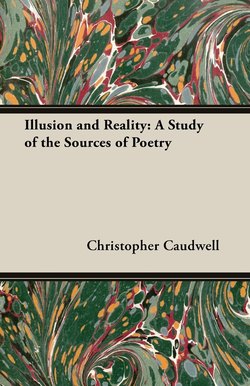Читать книгу Illusion and Reality: A Study of the Sources of Poetry - Christopher Caudwell - Страница 17
На сайте Литреса книга снята с продажи.
3
ОглавлениеThe gradual self-exposure of this illusion is the history of bourgeois freedom. We may find it as tragic as Macbeth, as comic as Falstaff, as inspiring as Henry V, or as disgusting as the world of Timon of Athens—all these aspects are reflected in its develpoment, corresponding to a similar development in the economic foundations.
Have we not said that tragedy is always a problem of necessity? To Oedipus tragedy appears in the very guise by which freedom seems to be secured in a slave-owning society—as Will, as Fate visualised in the form of a divine, superior will overriding all human wills.1 To Macbeth tragedy appears in the cloak of bourgeois freedom: man’s free desires intemperately issuing forth are reflected back upon him by circumstances and now appear as their opposite—Macbeth’s wishes, granted by the three Witches, reappear as those wishes inverted, as a contradiction of their very essence. Birnam Wood comes to Dunsinane and he is slain by a man not of woman born.
All bourgeois poetry is an expression of the movement of the bourgeois illusion, according as the contradiction rooted in bourgeois economy emerges in the course of the development of capitalism. Men are not blindly moulded by economy; economy is the result of their actions, and its movement reflects the nature of men. Poetry is then an expression of the real essence of associated men and derives its truth from this.
The bourgeois illusion is then seen to be a phantasy and bears the same relation to truth as the phantasy of primitive mythology. In the collective festival, where poetry is born, the phantastic world of poetry anticipates the harvest and, by so doing, makes possible the real harvest But the illusion of this collective phantasy is not a mere drab copy of the harvest yet to be: it is a reflection of, the emotional complex involved in the fact that man must stand in a certain relation to others and to the harvest, that his instincts must be adapted in a certain way to Nature and other men, to make the harvest possible. The collective poetry or the festival, although it is a confused perception of the real harvest-to-be, is an accurate picture of the instinctive adaptations involved in associated man’s relation to the harvest process. It is a real picture of man’s heart.
In the same way bourgeois poetry reflects in all its variety and complexity, the instinctive adaptations of men to each other and Nature necessary in those social relations which will produce freedom—for freedom, as we saw, is merely man’s phantastic and poetic expression for the economic product of society which secures his self-realisation. We include of course in this economic product not merely the commercial or saleable product of society, but the cultural and emotional products, including men’s consciousness themselves. Hence this bourgeois illusion regarding freedom, of which bourgeois poetry is the expression, has a reality in so far as it produces, by its existence, freedom—I do not mean in any formal sense, I mean that just as primitive poetry is justified by the material harvest it produces. which is the means of the primitive’s freedom, so bourgeois poetry is justified by the material product of the society which generates it in its movement. But it is a freedom not of all society, but of the bourgeois class which appropriates the major part of society’s products.
For freedom is not a state, it is a specific struggle with Nature. Freedom is always relative, relative to the success of the the struggle. The consciousness of the nature of freedom is not the simple contemplation of a metaphysical problem, but the very act of living and behaving like a man in a certain state of society. Each stage of consciousness is definitely won; it is only maintained as a living thing by social movement—the movement we call labour. The working-out of the bourgeois illusion concerning freedom, first as a triumphant truth (the growth and increasing prosperity of capitalism), next as a gradually revealed lie (the decline and final crisis of capitalism) and finally as its passage into its opposite, freedom as the life-won consciousness of social necessity (the proletarian revolution), is a colossal movement of men, materials, emotions and ideas, it is a whole history of toiling, learning, suffering and hoping men. Because of the scale, energy and material complexity of the movement, bourgeois poetry is the glittering, subtle, complex, many-sided thing it is. The bourgeois illusion which is also the condition of freedom for the bourgeoisie is realised in their own poetry, because bourgeois poets, like the rest of the bourgeoisie, realise it in their lives, in all its triumphant emotion, its tragedy, its power of analysis and its spiritual disgust. And the consciousness of social necessity which is the condition of freedom for the people as a whole in classless, communist society, will be realised in communist poetry because it can only be realised in its essence, not as a metaphisical formula, but by living as men in a developing communist society, which includes living as poets and readers of poetry.
